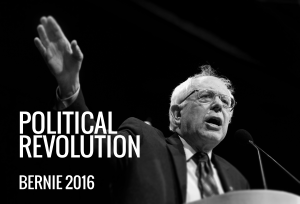Sen. Bernie Sanders is now using the word “revolution” to describe the nature of his bid to become president of the United States.
He’s leading Hillary Clinton in every poll there is in New Hampshire, which I think is filling the Vermont senator’s head with visions of overinflated grandeur.
It’s not that his Democratic support is fake. It’s real. But let’s cool the “revolution” talk for a bit.
Three presidential campaigns of the late 20th century also were labeled “revolutions” in some quarters. How did they do?
1964: Sen. Barry Goldwater of Arizona took the Republican Party presidential nomination by storm, defeating “establishment” candidates, such as New York Gov. Nelson Rockefeller in a wild primary fight. He went on to lose the general election that year to President Lyndon Baines Johnson in a historic landslide. LBJ, of course, traded a good bit on the legacy of his slain predecessor, John Kennedy, and vowed to continue pursuing JFK’s unfinished agenda.
1968: Just four years later, the Vietnam War caused another revolution. LBJ’s popularity had gone south. Democrats looked for an alternative. They turned to one in Sen. Eugene McCarthy of Minnesota, who stunned LBJ with a stronger-than-expected showing in the New Hampshire primary. In came another anti-war candidate, Sen. Robert F. Kennedy of New York, brother of the murdered president and a political hero to many Americans — including yours truly. Vice President Hubert Humphrey, another “establishment” candidate, won the nomination, but then lost to Republican Richard Nixon by a narrow margin that fall.
1972: Let’s call this one the Anti-Vietnam War Revolution 2.0. The flag bearer this time would be U.S. Sen. George McGovern of South Dakota, who beat the party “establishment” led by Sen. Ed Muskie of Maine to win the nomination. McGovern drew big crowds to rallies, too, just like Sanders. Did they equate to votes that November? Ummm, no. President Nixon won 49 out of 50 states and buried McGovern’s “revolution” under the landslide.
Yes, some “revolutions” succeed. Ronald Reagan’s landslide victory in 1980 is one. Barack Obama’s election in 2008 could be considered another one. But they required extraordinary circumstances. The Iranian hostage crisis hurt President Carter grievously in voters’ minds in ’80 and the economic free-fall of 2008 helped lift Sen. Obama into the White House eight years ago.
Sanders might think he’s carrying the torch for another revolution. Then again, Republicans such as Donald Trump, Ted Cruz and perhaps even Marco Rubio might want to say the same thing . . . for entirely different reasons.
I just want to remind the revolutionaries out there that the political establishment doesn’t get to be so entrenched and powerful by being made up of pushovers or patsies.
